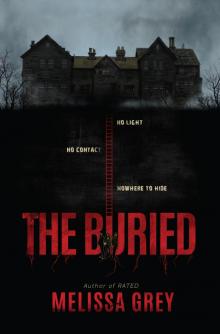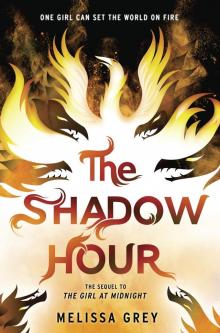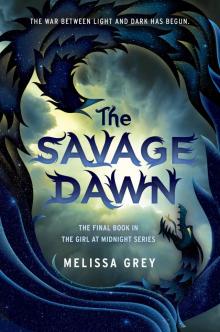- Home
- Melissa Grey
The Buried Page 2
The Buried Read online
Page 2
“Yuna,” her mother snapped. “People are waiting.”
With a little start, Yuna turned away from Sash and dutifully spooned a serving of gruel—calling it oatmeal would have been an insult to oats everywhere, if there were any left topside—onto her plate. The plates were curved at the edges, sort of like wide, shallow bowls. Good for multitasking a variety of edible goods, though variety wasn’t exactly what their daily cuisine was known for.
Breakfast in the bunker wasn’t quite the same every day, but it was close. Their menu was limited:
Powdered porridge of dubious origin and absolutely no flavor.
Canned goods until they ran out.
Greens from the “garden.” (Honestly, calling it a garden seemed a bit odd to Yuna considering it was underground, spread out under ultraviolet lights meant to mimic the sun. But no one had asked for her opinion on that particular issue, and so she had never seen fit to provide it.)
Freshly filtered water, occasionally punched up with fruit juice concentrate. All that was left was pear, which Yuna didn’t really like. Orange had been the first to go, maybe six years ago? Seven? Yuna had lost count. Apple was next. Then cranberry. The blueberry had been odd but enjoyable in its own way, but that had run out last week. So now it was pear or nothing. Yuna went for the pear. Plain water first thing in the morning upset her stomach.
Some kind of potted meat product. That was literally what it said on the tin: potted meat product. When she had asked her father what was in it, he had twisted his mouth into a pained grimace and said, “You don’t want to know.” She never asked again.
And sometimes eggs. They had a few chickens that still produced eggs, but those were usually saved for dinner. Moran had ideas about higher protein foods being better digested at night. Yuna had no idea if it was true or not.
“Yuna.” Her mother’s voice had always been sharp. Nine years, eleven months, and eight days underground had not softened it in the slightest.
With a smile, Yuna cradled her bowl in one hand and waved at Sash with the other. “See you at school.”
They’d started saying it as a joke. And then it stuck. The joke was that school would happen in the same place breakfast happened. It was also in the same place family meetings happened and announcements happened and daily prayer happened. Right here, in this room. All that changed was the arrangement of the tables.
Sash snorted, which was about as wordy as she usually was in the mornings. That was fine with Yuna. Some people were morning people. Sash was not one of those people. Though morning was a nebulous thing when you never saw the sun actually rise. Dawn was, at best, metaphorical. The track lighting that ran the length of the bunker did a poor job of imitating it, but beggars and choosers and some such.
Yuna’s parents were waiting for her when she took up her normal seat at their end of the table. The tables were metal, like the tin plates, and reminded Yuna vaguely of cafeteria tables in TV shows she used to watch Before. She’d gone to school herself, briefly, but it had been a small building attached to the church in town. It didn’t have tables like this. Kids ate on long wooden picnic tables outside if the weather was nice, but inside at their desks if it rained.
But that was a long time ago. Things were different now.
Yuna picked up her spoon and almost dropped it immediately at the death glare her mother shot her.
“We pray first,” came the expected hiss.
Her father, meanwhile, ignored them both. He blew on his coffee. Not sipping it, mind. Just blowing on it to cool it down. The tin cups had a habit of keeping it too hot to drink for quite some time.
“I know,” Yuna mumbled, laying the spoon down quietly on her napkin. She hadn’t planned on eating before they said prayer. She knew better than that. It was just that she liked having the spoon on the other side of the bowl from where it was usually placed by whoever was on table-setting duty that morning—it was Tuesday, so the Correas. Wednesday was the Shin family’s turn. Being left-handed wasn’t a sin.
But her mother glared at her all the same. Glaring was Lim Hyojin’s favorite pastime, and she excelled at it. She could teach a master class on it, just like Sash’s mother taught them ballet the way only a former dancer with the Bolshoi possibly could. With expert proficiency. The glare hadn’t always been quite so damning. Yuna remembered her mother being—not softer, really, but less brittle. She used to hum songs from the radio under her breath while packing Yuna’s lunch box. The finishing touch was always the inclusion of a cute drawing on those yellow sticky notes affixed to the box. Mostly they were animals doing things animals shouldn’t, like wearing sweaters or driving cars or baking cakes. There were no sticky notes in the bunker. No packed lunches. No radios. No songs.
She missed that version of her mother. Another thought she kept to herself. Airing it wouldn’t accomplish anything.
“Friends.” Dr. Moran’s voice carried over the soft sounds of people settling in. Tin bowls coming to rest on metal tables. The odd throat clearing. A cough from the perennially asthmatic Gabe. Poor kid. (They were the same age, but Yuna was taller when she stood up straight and had therefore earned the right to call him “kid.”) What he and his equally asthmatic younger brother Lucas probably needed more than anything was fresh air, which was the last thing they were ever going to get.
Silence fell over the three families assembled around their respective tables. Lucas, the youngest of them all, fidgeted in his seat, the toe of his worn-out sneaker scuffing against the metal floor. Faces turned to the doctor, who stood at the front of the room. The smile on her face was warm enough, Yuna supposed, but there was something that always seemed a bit off about it. It was the same every day. Not one variation in the crinkles around her eyes or in the slightly off-kilter tilt of her lips. The right corner of her mouth was always just slightly higher than the left. The depth of the fine lines around her smile was always exactly the same.
“Let us begin our day as we always do. In a moment of silent gratitude.” She clasped her hands together and bowed her head. Everyone followed suit. Almost everyone.
Yuna bowed her head but kept her eyes open just enough to see Sash sitting ramrod straight at the Eremenkos’ table. Her eyes were focused on the doctor, unwavering. Her head inclined not one inch.
Oh, Sash. Yuna knew the other girl would get a talking-to later, but lectures never seemed to deter her. If anything, they seemed to fuel her minor rebellions.
Moran had to have seen. Nothing escaped her notice. But she gave no hint that she was the slightest bit perturbed by Sash’s reticence. She carried on with her routine the same way she did every morning.
“We bow our heads in humble thanks for the food we are about to eat. For the walls that saved us from the storm.” Dr. Moran looked up and caught Yuna’s eyes.
Yuna dropped her gaze, but it was too late. Eye contact had been made.
“And most important, for the darkness that shelters us. For this, we are blessed.”
Twelve voices spoke as one, repeating the doctor’s words with dutiful synchronicity. “For this, we are blessed.”
Yuna glanced at Sash. The other girl’s lips were pressed together in a hard, firm line. Silent and stubborn. Some things never changed. Breakfast in the bunker. Moran’s beatific smile. And Sash. And for the latter, Yuna felt oddly blessed.
The hall lights flickered in and out overhead. They were always on, and power surges were common. Gabe was used to it at this point. It was always a little unnerving, but if he jumped out of his skin every time something weird happened in the bunker, he wouldn’t know one single moment of peace.
Understanding why the electricity was spotty helped. It was fed from a generator that ran on an underground water source that Gabe had never actually seen. He’d helped his father repair the generator on more than one occasion, so he had no reason to doubt its existence. They had electricity, and that was all that mattered. Well, they had it most of the time. Sometimes it had better things to do than ill
uminate their sad little lives underground.
His father swore as something in the wall panel sparked. Another common occurrence. Most of the time it felt like their lives were held together with duct tape and a prayer.
For this, we are blessed.
“Hand me the wrench.”
Gabe went fishing in the toolbox for said wrench. The box was a battered old thing, made of hammered red metal and adorned with more dings and scrapes than anyone cared to count. It had served them well, all these years in the bunker. And it would serve them well for more years to come.
Though Gabe didn’t like to dwell on that last part. He preferred to cling to the fiction that they would be able to leave. Soon. At some point. Any day now.
He plucked the wrench from the toolbox’s top shelf and handed it to his father.
“Here, Dad.”
The elder Correa reached for the wrench without taking his eyes off the circuit breaker in front of him. His hand flailed a bit before Gabe placed the wrench in his palm.
“Thanks, kid.”
Gabe pushed his glasses up his nose and went back to reading his comic book. (His glasses slid down roughly every twenty-seven seconds and would keep sliding right off his face if he didn’t keep pushing them up.) (Also, he had read this comic book no fewer than 436 times. He knew every twist, every turn, every misaligned color no matter how slight.)
“You paying attention?”
“Nope,” Gabe said, flipping the page. The paper was soft now, almost as soft as cotton. “Don’t need to.”
His dad snorted as he finally turned away from the circuit breaker. “All right, kid. If you’re so smart, you fix this thing.”
Gabe peered at his father over the top of the comic book. “Seriously?”
His dad wiped his hands on his faded jeans. “You should know how to do these things on your own.”
Because I won’t be around forever, was the unspoken second half of that sentence. Life was ephemeral. They knew that better than anyone.
“Okay,” Gabe said, because it was better than dwelling on the melancholy subject of mortality. He took the wrench from his father and slid into the space he’d vacated. So much of the bunker ran on mechanical power, but every now and then, the electric side of things reminded Gabe that it was likely designed by a half-mad lunatic who fancied himself the Nikola Tesla of the 1980s but was absolutely nothing of the sort.
“I’m going to go check on the water tank,” said his father. “You good here?”
Gabe hummed an affirmative sound under his breath without looking up. He was already absorbed in the task at hand.
“Don’t blow anything up.” A large hand settled on Gabe’s head, and before he could protest, said hand ruffled his hair.
“Ugh, Dad.”
Laughing, his father departed, whistling a jaunty tune that echoed against the metal walls.
Eventually, the laughter and the whistling faded, leaving Gabe alone in the corridor with nothing but his father’s tools to keep him company. The silence was pure and complete. But it was oddly constructed. The twists and turns and bends in corridors that led to nowhere had a way of absorbing sound that made it seem like one was entirely alone in the world.
That suited Gabe just fine.
Usually.
He set down the wrench and dove back into the toolbox when the ground beneath his feet vibrated. A loud whir reverberated through the walls. And then, the lights went out.
Gabe dropped the pliers he’d just picked up. The sound of them clattering into the toolbox was impossibly loud in the silence.
The corridor—and the rest of the bunker beyond—was dark.
Completely, thoroughly dark. The void-of-space-level dark.
This is normal, Gabe reminded himself. This happens all the time.
He was, perhaps, not half as brave as he fancied he was.
But after a moment, red lights flooded from the recessed alcoves set into the corners of the walls.
Red light, Gabe remembered. The words played through his mind during each and every one of these drills. They repeated like a mantra. Or a prayer. Or the periodic table, which was really just his version of a comforting litany. Red light inhabits the safe zone of the spectrum. They can’t see red. They aren’t attracted to red. Red will keep us safe.
He didn’t know what they were. No one did. Not really. But it didn’t matter in that moment. This was just a drill. And they couldn’t get into the bunker. Nothing could. It was hermetically sealed from the surface. Airtight. There was only one way in or out, and that was through the hatch, and the hatch was locked. His own father saw to it.
His own father who was somewhere close but not close enough to come back.
“Not even a tank could roll through this thing,” the elder Correa liked to say, patting the hatch’s wheel-shaped locking mechanism like a proud papa. “It’s built to stand up to a hydrogen bomb. Ten hydrogen bombs. Safe as houses down here.”
That was a phrase Gabe never quite got. Safe as houses. If a regular old house couldn’t stand up to a hydrogen bomb or a tank or whatever they were, how could a house be their model for safety? A thought best not dwelled on, but Gabe always loved a good dwell.
It was easier and far more preferable to think of these things during the drill than to consider what it would be like if this wasn’t actually a drill. If this was actually happening.
But it wasn’t.
Was it?
Gabe kicked the toolbox closed, swearing when his toe stubbed against the hard metal. He bent down to pick it up, groaning at the weight.
Leave it, whispered a voice at the back of his head.
His father would kill him if something happened to those tools. They were all they had. There was no popping into the hardware shop to pick up replacements. There was no hardware shop.
Grunting, Gabe pulled the toolbox into the nearest room, the sound of it scraping against the metal floor loud enough to make his bones shake. Even louder was the sound of it hitting the floor when Gabe dropped it and scrambled for the door. His own hands in front of his face were just dark silhouettes against the red light.
Every room in the bunker came equipped with a set of locks. Dead bolts that could stand up to a bomb.
Safe as houses.
He threw his weight against the door as the sound of a blaring alarm finally cut through the silence like a blade.
Late, he thought. Timing’s off. Someone should fix that.
He would fix that. Later though.
Now, he had to hide. Everyone would be hiding. Even his father, wherever he was.
Don’t think about that. Close the door. Throw the lock. Wait.
The door groaned on its rusted hinges. Someone should fix that too. It started to swing shut, slowly, as if operating at its own leisure.
Before the door closed, a voice called out, echoing through the corridor.
“Wait!”
Yuna?
The rule was not to wait. You never waited. If someone didn’t make it to safety in time, that was their problem.
Maximize rates of survival. Minimize potential for risk.
But Gabe waited.
The door was still swinging shut, too heavy to be stopped entirely, but Gabe pressed his shoulder against it and held it long enough for a small person to dart in through the opening.
Yuna was taller than Gabe, but she was almost frighteningly narrow. Which, he supposed, was a benefit when you had to fit in small spaces.
Once she was inside, Gabe let go of the door. It slammed closed, making them both jump.
Yuna doubled over, hands on her knees. “Thanks.”
Her breath came in harsh pants, as if she’d just run a marathon. She was in better shape than Gabe was (and she didn’t have asthma), so he wasn’t quite sure why she was breathing so heavily. Stress, probably. The drills were terrifying. That was their job. To scare them into action.
Gabe nodded, pushing his glasses up on his nose. He was sweating, though it
wasn’t hot and he hadn’t been running. Stress, again. It did a number on the body.
“Don’t mention it,” he said, sounding far cooler than he ever intended. “But, like, really don’t mention it. Moran would never let me hear the end of it if you did.”
Yuna crossed her heart. “Your secret is safe with me. No one will ever know you were too compassionate to let me die alone in the hallway.”
“Where were you anyway?”
Yuna gulped in another breath. “Garden. Visiting the plants. Wanted to make sure they weren’t hungry.”
It was such a Yuna way to phrase it. Checking the nutrient levels of the hydroponic systems. He loved her a little bit for that.
Now that they were safe (as houses), the adrenaline began to fade, leaving Gabe’s limbs feeling oddly tired. His lungs—never his strongest asset—labored a little harder than they usually did. His breath came in wheezes that sounded as painful as they felt. He hadn’t even been running. It simply wasn’t fair.
He slumped against the wall. There was no guessing how long the drill would last. It could be minutes. It could be hours. He was pretty sure they did one a few years ago that lasted an entire day. Like, a full rotation of Earth. A whole twenty-four hours. Insanity.
With much more grace than Gabe possessed in his whole body, Yuna joined him, crossing her legs daintily and sitting with her back to the wall. Their knees touched. Normally, Gabe didn’t like to be touched, but now, he didn’t quite mind. It was a nice reminder that he wasn’t alone. It was comforting in a way touch normally wasn’t. And it was rare. Touching people in the bunker was frowned upon. It was perhaps their oldest rule. It was so deeply ingrained in their collective psyche that avoiding contact was practically second nature at this point. Most of the time, the rule didn’t bug him. But now, he was glad to break it, even if just a little.

 Rated
Rated The Buried
The Buried The Shadow Hour
The Shadow Hour The Savage Dawn
The Savage Dawn